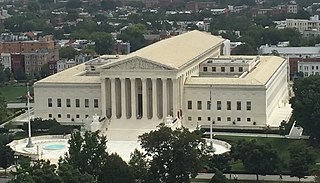This article needs additional citations for verification .(September 2014) |
The following is a list of United States court cases on cousin marriage. Currently only certain cases at the appellate level in the last sixty years are listed.
This article needs additional citations for verification .(September 2014) |
The following is a list of United States court cases on cousin marriage. Currently only certain cases at the appellate level in the last sixty years are listed.
| Name | Date | Forum | Description |
|---|---|---|---|
| Ex parte Bowen | March 21, 1952 | Court of Appeals of Kentucky [lower-alpha 1] | Held that due to the new Kentucky statute, the marriage was void and the veterans benefits should be denied to the spouse. |
| Matter of the Estate of Martin Emil Mortenson, deceased | October 29, 1957 | Supreme Court of Arizona | Cousin marriage not recognized because Arizona statutes declare the marriage "void" unless it was recognized in the place where solemnized, with the parties having resided in that place. In this case, the parties resided in Arizona and left to have the marriage solemnized in New Mexico. Wife received no share of the estate. |
| Mazzolini v. Mazzolini | December 24, 1958 | Supreme Court of Ohio | Held that because it was not declared void in statute, a cousin marriage solemnized elsewhere was valid in Ohio. Annulment not granted. |
| In re the Marriage of Earl E. Adams | December 31, 1979 | Supreme Court of Montana | Held that a first cousin marriage in Montana, where it was prohibited and where the courts were bound to declare it as void, was indeed void. The wife received no portion of the estate. |
| In the Matter of the Estate of Owen C. Loughmiller, Deceased | June 10, 1981 | Supreme Court of Kansas | Found that a marriage entered into outside the state of Kansas was valid because there is no statute in Kansas specifically voiding the marriage. The marriage was found valid and the separation agreement between the two parties was upheld. |
| Etheridge v. Shaddock | April 7, 1986 | Supreme Court of Arkansas | Found that a cousin marriage performed elsewhere was legal in Arkansas. A disputed change in child custody rights was therefore denied. Incidentally, it noted that a marriage between other closer relatives would not be recognized in this situation. [1] |
| Cook v. Cook | January 13, 2005 | Court of Appeals of Arizona, Division 1, Department A | Found that a cousin marriage performed elsewhere should be recognized because Arizona law at the time expressly directed such recognition, and although it was amended after the marriage, retroactive application of the law was not called for. Consequently, dissolution of the marriage was not granted. |

An appellate court, commonly called a court of appeal(s), appeal court, court of second instance or second instance court, is any court of law that is empowered to hear an appeal of a trial court or other lower tribunal. In much of the world, court systems are divided into at least three levels: the trial court, which initially hears cases and reviews evidence and testimony to determine the facts of the case; at least one intermediate appellate court; and a supreme court (or court of last resort) which primarily reviews the decisions of the intermediate courts, often on a discretionary basis. A particular court system's supreme court is its highest appellate court. Appellate courts nationwide can operate under varying rules.
In the United States, a state supreme court is the highest court in the state judiciary of a U.S. state. On matters of state law, the judgment of a state supreme court is considered final and binding in both state and federal courts.
In the United States, a state court has jurisdiction over disputes with some connection to a U.S. state. State courts handle the vast majority of civil and criminal cases in the United States; the United States federal courts are far smaller in terms of both personnel and caseload, and handle different types of cases. States often provide their trial courts with general jurisdiction and state trial courts regularly have concurrent jurisdiction with federal courts. Federal courts are courts of limited jurisdiction and their subject-matter jurisdiction arises only under federal law.

The United States courts of appeals are the intermediate appellate courts of the United States federal judiciary. They hear appeals of cases from the United States district courts and some U.S. administrative agencies, and their decisions can be appealed to the Supreme Court of the United States. The courts of appeals are divided into 13 "Circuits". Eleven of the circuits are numbered "First" through "Eleventh" and cover geographic areas of the United States and hear appeals from the U.S. district courts within their borders. The District of Columbia Circuit covers only Washington, DC. The Federal Circuit hears appeals from federal courts across the entire United States in cases involving certain specialized areas of law.

In the United States, a district attorney (DA), county attorney, county prosecutor, state's attorney, prosecuting attorney, commonwealth's attorney, state attorney or solicitor is the chief prosecutor or chief law enforcement officer representing a U.S. state in a local government area, typically a county or a group of counties. The exact scope of the office varies by state. Generally, the prosecutor represents the people of the jurisdiction in the state's courts. With the exception of three states, district attorneys are elected, unlike similar roles in other common law jurisdictions.
The federal judiciary of the United States is one of the three branches of the federal government of the United States organized under the United States Constitution and laws of the federal government. The U.S. federal judiciary consists primarily of the U.S. Supreme Court, the U.S. Courts of Appeals, and the U.S. District Courts. It also includes a variety of other lesser federal tribunals.

The Kentucky Supreme Court is the state supreme court of the U.S. state of Kentucky. Prior to its creation by constitutional amendment in 1975, the Kentucky Court of Appeals was the only appellate court in Kentucky. The Kentucky Court of Appeals is now Kentucky's intermediate appellate court.
Richard John Baker v. Gerald R. Nelson, 291 Minn. 310, 191 N.W.2d 185 (1971), was a case in which the Minnesota Supreme Court decided that construing a marriage statute to restrict marriage licenses to persons of the opposite sex "does not offend" the U.S. Constitution. Baker appealed the decision, and on October 10, 1972, the U.S. Supreme Court dismissed the appeal "for want of a substantial federal question".

Deborah Louise Cook is a senior United States circuit judge of the United States Court of Appeals for the Sixth Circuit, based in Akron, Ohio. She served as a justice of the Ohio Supreme Court from 1995 to 2003.

In most legal jurisdictions, a supreme court, also known as a court of last resort, apex court, and highcourt of appeal, is the highest court within the hierarchy of courts. Broadly speaking, the decisions of a supreme court are binding on all other courts in a nation and are not subject to further review by any other court. Supreme courts typically function primarily as appellate courts, hearing appeals from decisions of lower trial courts, or from intermediate-level appellate courts. A Supreme Court can also, in certain circumstances, act as a court of original jurisdiction, however, this is typically limited to constitutional law.

As established and defined by the Kentucky Constitution, the government of the Commonwealth of Kentucky is composed of three branches: the Executive, Judicial, and Legislative.
In law, an appeal is the process in which cases are reviewed by a higher authority, where parties request a formal change to an official decision. Appeals function both as a process for error correction as well as a process of clarifying and interpreting law. Although appellate courts have existed for thousands of years, common law countries did not incorporate an affirmative right to appeal into their jurisprudence until the 19th century.
Same-sex marriage has been legal in Kentucky since the U.S. Supreme Court's ruling in Obergefell v. Hodges on June 26, 2015. The decision, which struck down Kentucky's statutory and constitutional bans on same-sex marriages, was handed down on June 26, 2015, and Governor Steve Beshear and Attorney General Jack Conway announced almost immediately that the court's order would be implemented.